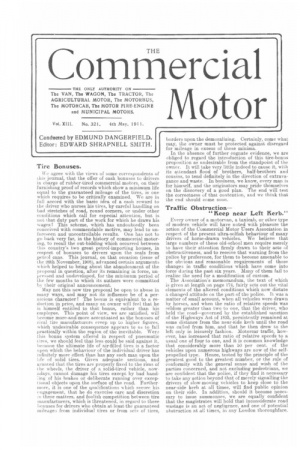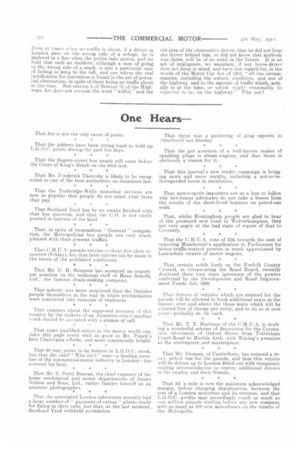Tire Bonuses.
Page 1

Page 2

If you've noticed an error in this article please click here to report it so we can fix it.
We agree with the views of some correspondents of this journal, that the offer of cash bonuses to drivers in charge of rubber-tired commercial motors, on their furnishing proof of records which show a minimum life equal to the guaranteed mileage of the tires, is one which requires to be critically examined. We are in full accord with the basic idea of a cash reward to the driver who nurses his tires, by careful handling on bad stretches of road, round corners, or under other conditions which call for especial attention, but is not that duty part of the work for which he draws his wages? This scheme, which has undoubtedly been conceived with commendable motive, may lead to unforeseen and uncontrollable results. One has not to go back very far, in the history of commercial motoring, to recall the out-bidding which occurred between this country's two great petrol-importing houses, in respect of bonuses to drivers upon the seals from petrol cans. This journal, on that occasion (issue of the 26th November, 1908), advanced certain arguments which helped to bring about the abandonment of the proposal in question, after its remaining in force, unpressed and undeveloped, for the minimum period of the few months to which it authors were committed by their original announcement.
May not this new tire proposal be open to abuse in ninny ways, and may not its influence be of a pernicious character? The bonus is equivalent to a reduction in price, and many an owner will feel that he is himself entitled to that bonus, rather than his employee. This point of view, we are satisfied, will become mote-and-more accentuated as the bonuses of rival tire manufacturers creep up to higher figures, which undesirable consequence appears to us to fall practically within the region of the inevitable. Were this bonus system offered in respect of pneumatic tires, we should feel that less could be said against it, because the ultimate life of air-filled tires is a factor upon which the behaviour of the individual driver has infinitely more effect than has any such man upon the life of solid tires. Given adequate sections, and granted that the tires are properly fixed to the rims of the wheels, the driver of a solid-tired vehicle, nowadays, cannot damage his tires except by bad handling of his brakes or deliberate running over except ional objects upon the surface of the road. Furthermore, it is one of the qualifications which secure his engagement, that he do exercise care and discretion in these matters, and foolish competition between tire manufacturers, which is threatened, in regard to these bonuses for drivers who obtain at least the guaranteed mileages from individual tires or from sets of tires, borders upon the demoralizing. Certainly, come what may, the owner must be protected against disregard for mileage in excess of these minima.
In the absence of further cognate evidence, we are obliged to regard the introduction of this tire-bonus proposition as undesirable from the standpoint of the owner. It will take very little indeed to cause it, with its attendant flood of brothers, half-brothers and cousins, to tend definitely in the direction of extravagance and waste. In business, we know, every man is for himself, and the originators may pride themselves on the discovery of a good plan. The end will test the correctness of that contention, and we think that the end should come soon.
Traffic Obstruction—
"Keep near Left Kerb."
Every owner of a motorvan, a taxicab, or other type of modern vehicle will have noted with pleasure the action of the Commercial Motor Users Association in respect of the present ultra-selfish behaviour of many drivers of horse-drawn vehicles. We believe that large numbers of these old-school men require merely to have their attention firmly drawn to their acts of obstructiveness, and to receive that warning from the police by preference, for them to become amenable to the obvious and reasonable requirements of those changes in traffic conditions which have come into force during the past six years. Many of them fail to realize the need for a modification of custom.
The Association's memorandum, the text of which is given at length on page 174, fairly sets out the vital elements of the altered conditions which now dictate a changed attitude on the part of the police. It was a matter of small account, when all vehicles were drawn by horses, and when the ratio of relative speeds was seldom greater than two to one, that the driver, who held the road—governed by the established sanction of the Highways Act of 1835, persistently remained at some distance from the near-side kerb until the road was called from him, and that he then drew to the left only in leisurely fashion. Motorcar traffic, however, has increased that ratio of relative speeds to a usual one of four to one, and it is common knowledge that considerably more than 50 per cent. of the vehicles upon numerous highways are now of the selfpropelled type. Hence, tested by the principle of the greatest good to the greatest number, or the rule of conformity with the general sense and wish of the parties concerned, and not excluding pedestrians, we are confident that the police, if they find it necessary to take any action beyond that of merely signalling the drivers of slow-moving vehicles to keep close to the near-side kerb at all times, will find public opinion on their side. In addition, should it become necessary to issue summonses, we are equally confident that the magistrates will hold that inconsiderate road wastage is an act of negligence, and one of potential obstruction at all times, in any London thoroughfare. -Even at times when no traffic is about, if a driver in London pass on the wrong side of a refuge, he is mulcted in a fine when the police take action, and we hold that such an incident, although a case of going to the wrong side of a mark, is also a particular case of failing to keep to the left, and one where the real justification for conviction is found in the act of potential obstruction, in spite of there being no traffic about at the time. Sub-section 5 of Section 78 of the Highways Act does not contain the word "wilful," and the old plea of the obstructive driver, that he did not hear the driver behind him, or did not know that anybody was there, will be of no avail in the future. It is an act of negligence, we maintain, if any horse-driver does not keep in mind, and have due regard for, in the words of the Motor Car Act of 1903, 'all the circumstances, including the nature, condition, and use of the highway, and to the amount of traffic which, actually is at the time, or which might reasonably be expected to be, on the highway." Why not?




















